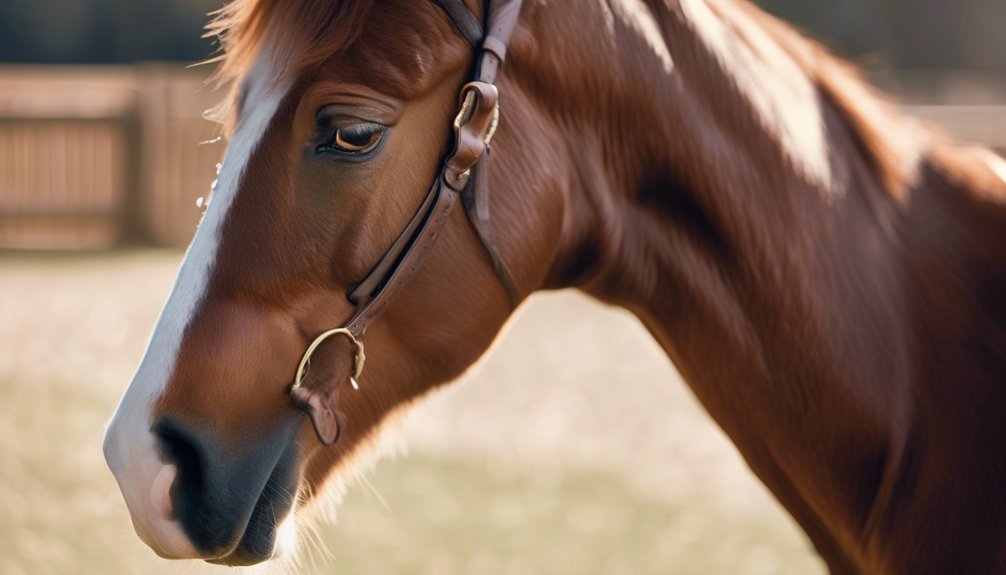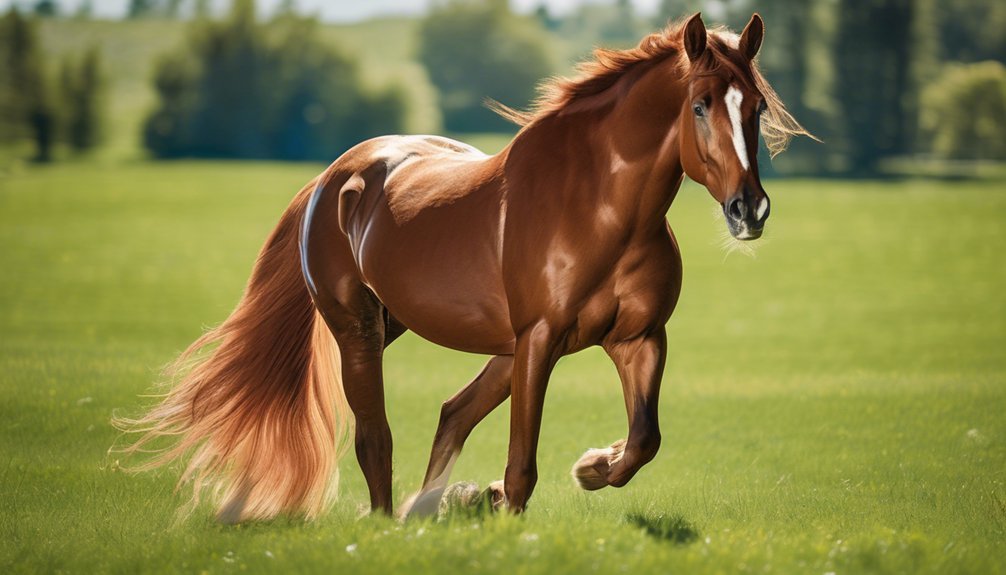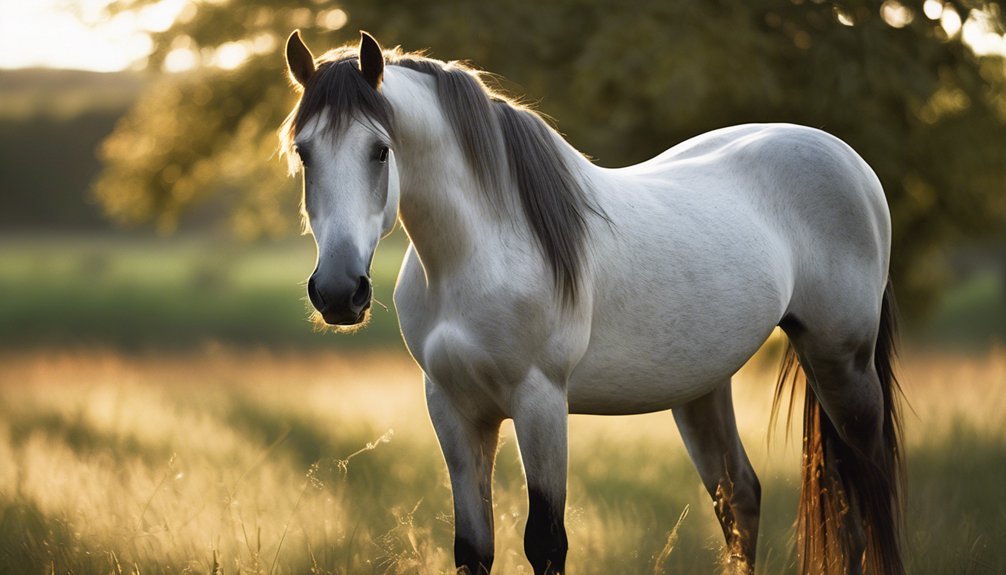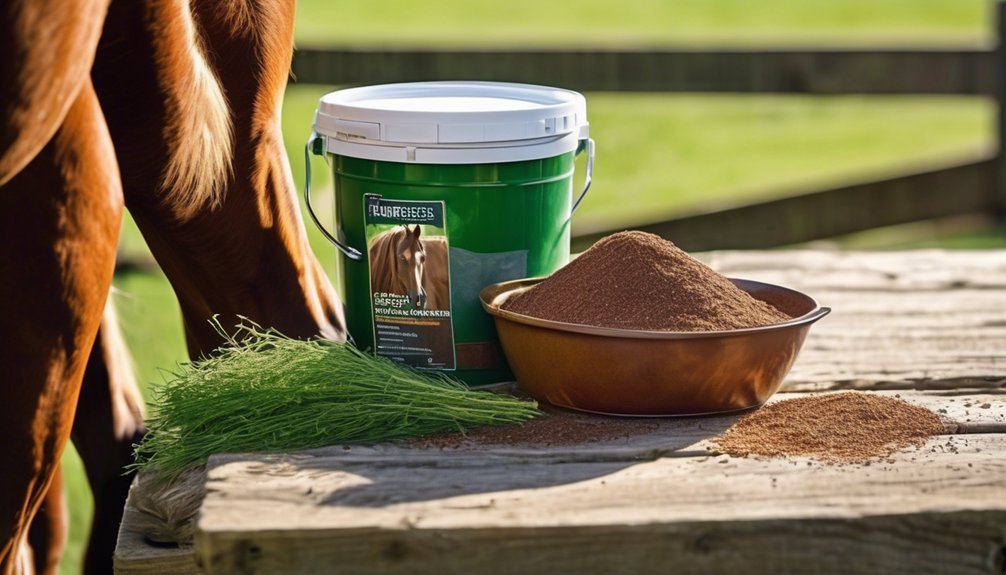
Flakiness in horse coats can be a sign of underlying issues that need attention. It often stems from nutritional deficiencies, environmental factors, or improper grooming practices. By understanding these causes, you can implement effective strategies to improve your horse's coat health. But before you start making changes, it's crucial to assess your horse's specific needs and conditions. Let's explore the key factors that contribute to a healthy, vibrant coat.
Key Takeaways
- Ensure proper hydration by providing fresh water and maintaining a balanced diet rich in essential fatty acids and protein.
- Regularly groom your horse to remove dirt and stimulate the skin, using appropriate tools like curry combs and stiff brushes.
- Monitor environmental conditions; avoid excessive sun exposure and maintain a clean, dust-free area to reduce skin irritation.
- Limit bathing to every 4-6 weeks to preserve natural oils that keep the coat moisturized.
- Consult a veterinarian if flakiness persists or if there are changes in skin texture or excessive itching.
Understanding the Causes of Flakiness in Horse Coats

Understanding the causes of flakiness in horse coats is essential for maintaining your horse's overall health and appearance.
Flaky skin often results from inadequate coat hydration, which can stem from environmental factors or insufficient grooming. Dry air, seasonal changes, or excessive sun exposure can strip moisture from your horse's skin, leading to flakes.
Additionally, bathing too frequently can wash away natural oils, further contributing to dryness. It's crucial to monitor your horse's skin condition regularly; any significant changes might indicate underlying health issues.
To combat flakiness, ensure your horse stays hydrated and consider using moisturizing products specifically designed for equine coats. By addressing these factors, you can help your horse maintain a healthy, shiny coat that reflects its vitality.
Nutritional Factors That Affect Coat Health
While environmental factors play a significant role in coat flakiness, nutrition also directly impacts your horse's skin and coat health. Dietary deficiencies can lead to a dull, flaky coat, so it's crucial to ensure your horse receives a balanced diet rich in essential fatty acids. These fatty acids promote a healthy coat by keeping it moisturized and reducing flakiness.
| Nutrient | Importance | Sources |
|---|---|---|
| Essential Fatty Acids | Enhances coat luster | Flaxseed oil, fish oil |
| Protein | Supports hair structure | Quality hay, grains |
| Vitamins A & E | Promotes skin health | Fresh fruits, vegetables |
Monitor your horse's diet closely to maintain a vibrant, healthy coat.
Environmental Influences on Coat Condition

Environmental factors significantly impact your horse's coat condition, as elements like humidity, temperature, and exposure to sunlight can contribute to flakiness.
Weather changes and environmental stressors can lead to dryness and irritation, affecting the overall health of your horse's coat. To maintain a healthy coat, consider these factors:
- Humidity Levels: High humidity can promote fungal growth, while low levels can dry out the skin.
- Temperature Fluctuations: Rapid temperature changes can stress your horse's skin.
- Sun Exposure: Prolonged exposure can cause sunburn and coat fading.
- Dust and Allergens: A dusty environment can irritate sensitive skin, leading to flakiness.
Being aware of these influences helps you take proactive measures to keep your horse's coat healthy and vibrant.
Grooming Practices to Prevent Flakiness
To combat flakiness in your horse's coat, effective grooming practices play a vital role. Regular grooming not only removes dirt and debris, but it also stimulates the skin and distributes natural oils, enhancing coat health. Utilize appropriate grooming tools, like curry combs and soft brushes, to maintain a healthy coat texture.
| Grooming Tool | Purpose |
|---|---|
| Curry Comb | Loosens dirt and debris |
| Stiff Brush | Removes loose hair |
| Soft Brush | Smooths and shines the coat |
Aim for a consistent bathing frequency, ideally every 4-6 weeks, to prevent skin issues while keeping the coat clean. By following these practices, you'll help your horse maintain a healthy, flake-free coat.
Supplements and Remedies for a Healthy Coat

Incorporating the right supplements and remedies can significantly improve your horse's coat health and combat flakiness. Here are some effective options for coat conditioning:
- Omega-3 Fatty Acids: These promote a shiny coat and reduce dryness.
- Biotin: Known for strengthening hooves, it also supports healthy skin and coat.
- Flaxseed Oil: A natural remedy rich in essential fatty acids, enhancing coat luster.
- Herbal Blends: Ingredients like nettle and dandelion can nourish the skin and coat naturally.
These supplements and remedies work together to ensure your horse's coat remains vibrant and healthy.
When to Consult a Veterinarian
While supplements and remedies can significantly enhance your horse's coat health, there are situations where professional guidance is necessary.
If you notice persistent flakiness, changes in skin texture, or excessive itching, a symptom evaluation is crucial. These signs could indicate underlying issues like allergies, infections, or skin conditions that require expert attention.
A thorough skin examination by a veterinarian will help identify the root cause and determine the appropriate treatment plan.
Don't hesitate to consult a vet if your horse shows signs of distress or if the coat's condition worsens despite your efforts.
Timely intervention can prevent complications and promote your horse's overall well-being, ensuring they shine with health and vitality.
Frequently Asked Questions
Can Flakiness Indicate a More Serious Health Issue?
Flakiness can indeed signal more serious health issues. It might indicate skin infections or nutritional deficiencies. You should monitor your horse closely and consult a veterinarian if you notice persistent or worsening symptoms.
How Long Does It Take to See Improvements in Coat Condition?
Ever wondered how quickly change can happen? You'll typically see improvements in coat condition within four to six weeks after making dietary adjustments and implementing effective grooming techniques. Consistency is key—your efforts will pay off!
Are Certain Breeds More Prone to Coat Flakiness?
Certain breeds do exhibit greater susceptibility to coat flakiness due to genetic factors. You'll find that breeds with specific coat types or inherent health issues might struggle more, so keep an eye on their condition.
Can Weather Changes Affect My Horse's Coat Health?
Yes, weather changes can significantly impact your horse's coat health. Fluctuations in humidity and temperature require you to adjust coat maintenance routines, ensuring your horse stays comfortable and retains a healthy, shiny coat throughout varying conditions.
Is Flakiness Seasonal, and Does It Vary by Region?
Yes, flakiness can be seasonal, influenced by humidity and temperature changes. Regional differences also play a role, as certain climates may exacerbate or alleviate coat issues. Closely monitor your horse's environment to ensure optimal coat health.
Conclusion
In addressing flakiness in your horse's coat, remember that "you are what you eat." By ensuring a balanced diet rich in essential fatty acids, proteins, and vitamins, along with regular grooming and bathing, you can significantly improve coat health. Keep an eye on environmental factors and be proactive in your horse's care. If you notice persistent flakiness or other skin issues, don't hesitate to consult a veterinarian for a thorough evaluation and tailored treatment plan.





